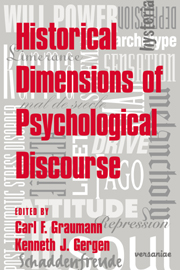Book contents
- Frontmatter
- Contents
- List of contributors
- 1 Psychological discourse in historical context: An introduction
- Part I Disciplining psychological discourse
- 2 The practice of psychological discourse
- 3 From tools to theories: Discovery in cognitive psychology
- 4 Metaphor and monophony in the twentieth-century psychology of emotions
- 5 Psyche and her descendants
- Part II History as culture critique
- Part III Early antecedents
- Part IV Lived history
- Author index
- Subject index
5 - Psyche and her descendants
Published online by Cambridge University Press: 20 October 2009
- Frontmatter
- Contents
- List of contributors
- 1 Psychological discourse in historical context: An introduction
- Part I Disciplining psychological discourse
- 2 The practice of psychological discourse
- 3 From tools to theories: Discovery in cognitive psychology
- 4 Metaphor and monophony in the twentieth-century psychology of emotions
- 5 Psyche and her descendants
- Part II History as culture critique
- Part III Early antecedents
- Part IV Lived history
- Author index
- Subject index
Summary
A century of psychology
Every now and then the closing century has been named the century of psychology. Whether this label is justified is still too early to say. But among the many names this century was given at its beginning, some had at least a psychological flavor or were meant to relate to psychology. When LeBon spoke of the era of the masses, William Stern of the century of individuality, Ellen Key of the century of the child, they named and fixed topics of public concern that, although not exclusively psychological, contributed to the growth of interest in the new science of psychology. Psychology, from its infancy in the late nineteenth century, had made children and development, character and personality, and the mind and behavior of crowds key topics of concern. Crowd psychology and psychoanalysis, and also the more academically respectable child and personality psychologies, very soon after the turn of the century contributed to at least the educated public discourse. The influx of psychological words and phrases has had its ups and downs, but today, at the end of the century, we may state that it is still going on, so that at least psychological discourse has become a characteristic feature of the twentieth century.
Whenever we join a social gathering, open a paper of the rainbow press or an illustrated magazine, listen to so-called educational broadcasts or watch television talk shows, we can rely on being confronted with a jargon or lingo that looks or sounds “psychological,” although in many cases this “psychotalk” only bears a slight resemblance to the professional language of psychology lectures and textbooks.
- Type
- Chapter
- Information
- Historical Dimensions of Psychological Discourse , pp. 83 - 100Publisher: Cambridge University PressPrint publication year: 1996
- 4
- Cited by

